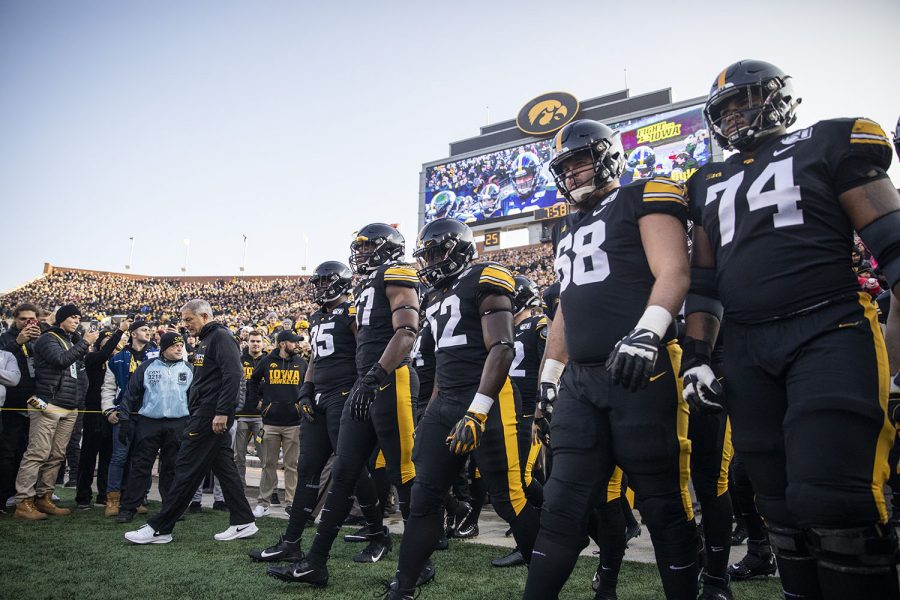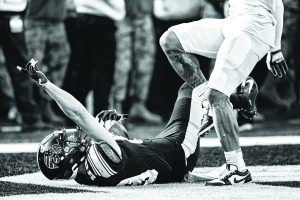Hawkeye football season this fall will be anything but normal
A Big Ten football season will take place this fall, but it will look different than ever before for the Hawkeyes. Players might opt-out, and those on the field could decide to kneel during the national anthem.
Iowa head coach Kirk Ferenzt and members of the Iowa football team walk onto the field before a football game between Iowa and Minnesota at Kinnick Stadium on Saturday, November 16, 2019. The Hawkeyes defeated the Gophers, 23-19.
September 20, 2020
The Iowa football team will take the field this fall, but the season will be anything but normal.
Players may opt not to play, the regular season will extend into December, there will be daily COVID-19 testing, and the team is deciding if it will kneel during the national anthem.
The Big Ten announced Sept. 16 that its Council of Presidents and Chancellors unanimously voted to resume the conference’s football season starting Oct. 23-24. The conference previously announced on Aug. 11 that all fall sports were postponed in the conference because of ongoing concerns with the COVID-19 pandemic.
Now, 14 teams around the conference are preparing for a season they didn’t necessarily even anticipate would happen.
“We’re raring to go,” Iowa head football coach Kirk Ferentz said on a Sept. 17 video conference. “But we’re hardly ready to go. That’s really the challenge that’s in front of us right now.”
Iowa’s season is scheduled to start Oct. 24 in West Lafayette against Purdue. The team’s eight-game regular season schedule will conclude Dec. 12 in Iowa City against Wisconsin.
The schedule leaves no margin for error. Eight games need to be played in eight weeks, leaving a chance that some contests are canceled and can’t be rescheduled because of COVID-19. There’s also an added ninth game against a cross-divisional opponent the same week as the Big Ten Championship Game.
RELATED: Big Ten calls an audible, will play football season this fall
None of these games, as of now, will take place in front of fans. The Big Ten announced that public tickets will not be sold to any games. Only family of athletes or staff members will be allowed to attend.
“Normally you come out of the tunnel with that adrenaline rush from the fans anticipating the swarm and all those things you’re accustomed to,” Ferentz said. “It’ll probably be a little bit of an adjustment for all of us.”
Iowa may start the season without its entire roster. Ferentz said a “small number” of players have expressed concerns with playing this season.
The Hawkeyes haven’t been in pads since their Holiday Bowl victory in December. The COVID-19 pandemic eliminated Iowa’s spring practices before they even started. Ferentz said the team’s training camp, which usually takes place in August, will likely be less intense than usual because his players are also currently in classes.
The Big Ten was expected to compete in a football season in the winter or the spring after its decision to postpone. The conference has adopted daily antigen testing for all athletes, coaches, and staff members that are on the field for practices or games as part of its return to play.
“Having the availability, the reliability, the opportunity to test daily was the game-changer,” Iowa Athletic Director Gary Barta said Sept. 17.
A team COVID-19 outbreak could prevent a game from happening, and a positive test will keep a player out for at least 21 days. Daily testing will begin by Sept. 30.
Despite all the uncertainty that still remains with COVID-19, perhaps the biggest question mark for Iowa heading into a season full of them is what the team will do during the national anthem.
An investigation into the program’s culture took place over the summer after several Black former players said they experienced racism and were mistreated in their time with the Iowa football program. Former strength and conditioning coach Chris Doyle, who many players specifically mentioned as being a problem, reached a separation agreement with the University of Iowa that will pay him $1.1 million.
Since then, part of the team’s discussions have turned to using its platform to promote racial justice. Ferentz has said the team has considered kneeling during the anthem, but has not yet come to a final decision.
“Obviously that’s been tabled because we didn’t think we were playing until January so it really hasn’t been an object of focus,” Ferentz said. “But we’ll have plenty of time to revisit that now.”






